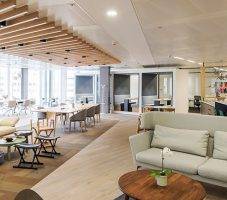July 20, 2016
Public health body calls for vaping rooms and extra breaks for e-cigarette users 0
 For those who recall the endless arguments about the rights of smokers and non-smokers that took place both before and after the ban on smoking in public places, the news that Public Health England has advised employers to set up vaping rooms for e-cigarette users will have a familiar feel. The governmental body claims that employers should make it comparatively easier for people to vape in an effort to persuade more smokers to kick their tobacco habit in favour of vaping, which it claims is 95 percent safer. While it acknowledges that smokers are commonly obliged to huddle outside buildings to indulge their habit, the advice suggests that being forced to vape outdoors as well only serves to “undermine their ability to quit smoking”. The advice suggests that of the 2.8 million people who now vape in the UK, the overwhelming majority are former smokers. However, although their habit is less harmful than tobacco smoking, employers treat both groups in the same way.
For those who recall the endless arguments about the rights of smokers and non-smokers that took place both before and after the ban on smoking in public places, the news that Public Health England has advised employers to set up vaping rooms for e-cigarette users will have a familiar feel. The governmental body claims that employers should make it comparatively easier for people to vape in an effort to persuade more smokers to kick their tobacco habit in favour of vaping, which it claims is 95 percent safer. While it acknowledges that smokers are commonly obliged to huddle outside buildings to indulge their habit, the advice suggests that being forced to vape outdoors as well only serves to “undermine their ability to quit smoking”. The advice suggests that of the 2.8 million people who now vape in the UK, the overwhelming majority are former smokers. However, although their habit is less harmful than tobacco smoking, employers treat both groups in the same way.









 SMEs that neglect to offer flexible work options may find their employees decide to switch to somewhere that does, according to a survey from
SMEs that neglect to offer flexible work options may find their employees decide to switch to somewhere that does, according to a survey from 
 The ethics of everyday working life are the subject of two new surveys. A study from job site
The ethics of everyday working life are the subject of two new surveys. A study from job site 
 The 21st Century has seen an explosion of self employment in the UK, and most people who have become self employed have done so for positive reasons, claims a new report from the UK Government’s Office for National Statistics. According to the
The 21st Century has seen an explosion of self employment in the UK, and most people who have become self employed have done so for positive reasons, claims a new report from the UK Government’s Office for National Statistics. According to the 
 Gensler has announced the results of its Workplace Survey 2016 for both
Gensler has announced the results of its Workplace Survey 2016 for both 
 There is an ancient Asian parable which has found its way into a number of cultures including Hindu and Buddhist lore. In one version, the Buddha tells of a king who has nine blind men summoned to his palace. An elephant is brought in and they are asked to describe it. Each man feels a different part of the elephant and describes it to the king. In turn they tell him it is a pot (the man who feels the head), a winnowing basket (ear), a ploughshare (tusk), a plough (trunk), a granary (body), a pillar (foot), a mortar (back), a pestle (tail) or a brush (tip of the tail). They disagree violently with each other to the amusement of the king, and the Buddha surmises that ‘in their ignorance they are by nature quarrelsome, wrangling, and disputatious, each maintaining reality is thus and thus.’ Around 2,500 years later, groups of people continue to describe big things solely based on the bits with which they come into contact and bicker with others who are close to other bits.
There is an ancient Asian parable which has found its way into a number of cultures including Hindu and Buddhist lore. In one version, the Buddha tells of a king who has nine blind men summoned to his palace. An elephant is brought in and they are asked to describe it. Each man feels a different part of the elephant and describes it to the king. In turn they tell him it is a pot (the man who feels the head), a winnowing basket (ear), a ploughshare (tusk), a plough (trunk), a granary (body), a pillar (foot), a mortar (back), a pestle (tail) or a brush (tip of the tail). They disagree violently with each other to the amusement of the king, and the Buddha surmises that ‘in their ignorance they are by nature quarrelsome, wrangling, and disputatious, each maintaining reality is thus and thus.’ Around 2,500 years later, groups of people continue to describe big things solely based on the bits with which they come into contact and bicker with others who are close to other bits.



 The shortlist for
The shortlist for 
 It was Frank Lloyd Wright who said ‘a doctor can bury his mistakes but an architect can only advise his clients to plant vines’. His words will be ringing in the ears of London planners who have decided they need to do something about the blight of Rafael Viñoly’s reviled Walkie Talkie building at 20 Fenchurch Street, according to
It was Frank Lloyd Wright who said ‘a doctor can bury his mistakes but an architect can only advise his clients to plant vines’. His words will be ringing in the ears of London planners who have decided they need to do something about the blight of Rafael Viñoly’s reviled Walkie Talkie building at 20 Fenchurch Street, according to 









July 22, 2016
The people centric urge to personalise space helps firms to engage employees 0
by Paul Goodchild • Case studies, Comment, Wellbeing, Workplace design
(more…)